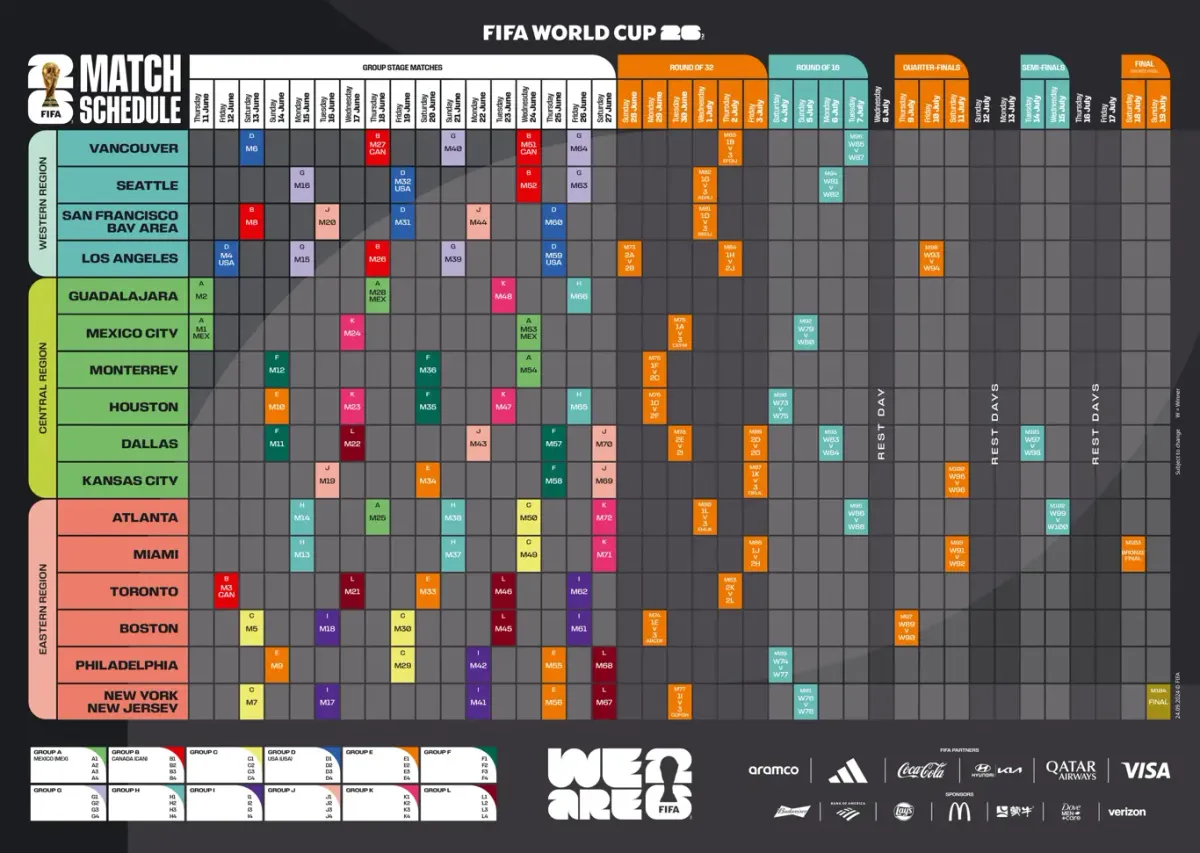
By Elke Porter | WBN News Global | July 21, 2025
Subscription to WBN and being a Writer is FREE!
Ambitious Plans Face Stadium Readiness Concerns
The FIFA World Cup 26 promises to be a historic tournament, marking the largest World Cup ever with 48 teams competing across 104 matches. Set to take place from June 11 to July 19, 2026, this unprecedented event will span three countries—Canada, Mexico, and the United States—utilizing 16 host cities. However, the ambitious schedule remains subject to potential changes as several stadiums face construction and renovation challenges.
Tournament Structure and Key Dates
The tournament will return to its traditional summer schedule after the winter timing of Qatar 2022. Mexico City's iconic Estadio Azteca will host the opening match on Thursday, June 11, 2026, while the MetLife Stadium in New York New Jersey has been selected for the final on Sunday, July 19. The full match schedule, announced on February 4, 2024, demonstrates FIFA's commitment to showcasing North America's diverse soccer landscape.
The group stage will kick off with Mexico's opening match at the legendary Azteca, followed by Canada's inaugural game at Toronto Stadium on June 12, and the United States' first match at Los Angeles Stadium the same day. The initial weekend will feature eight matches across various venues, including games in Boston, Vancouver, Philadelphia, Houston, Dallas, and Monterrey.
Stadium Readiness Concerns
Despite the comprehensive scheduling, FIFA officials acknowledge that the match schedule remains flexible due to ongoing stadium preparations. The challenges extend beyond simple construction delays—they involve fundamental issues with American sports infrastructure.
"The grass was patchy, uneven and sometimes tore during games. Argentina's head coach Lionel Scaloni said the turf was spray-painted to appear greener than it actually was" during last year's Copa America, according to YNet News. This served as a stark warning for FIFA ahead of the 2026 tournament.
The core problem lies in America's football-centric stadium design. Most of the 16 venues selected were built for American football, not soccer, and seven currently use artificial turf while FIFA mandates natural grass. As YNet News reports, stadiums in Atlanta, Miami, Seattle, Philadelphia, and New Jersey weren't designed for natural grass, with some featuring roofs that block sunlight and complicate grass growth.
The Copa America experience highlighted these challenges dramatically. After a match in Atlanta, Argentina's coach called the field "unfit for players of this level," while others described playing surfaces as resembling "a trampoline" and "a disaster." The potential solution involves hybrid surfaces with natural grass interwoven with synthetic fibers, but achieving FIFA-grade quality requires "an army working around the clock, robotic tractors and endless testing," according to sports analysts.
The potential for schedule adjustments has created uncertainty for fans and organizers alike. Cities with delayed stadium projects may face the possibility of having matches relocated to alternative venues, which could significantly impact local economies and fan travel plans.
Impact on Fans and Planning
For soccer enthusiasts planning to attend multiple matches, the fluid nature of the schedule presents both challenges and opportunities. Fans aiming to attend eight or more games must remain flexible with their travel arrangements and accommodation bookings. The opening and closing ceremonies are expected to command premium ticket prices, making early planning essential despite the scheduling uncertainty.
The tri-national format offers unique opportunities for fans to experience diverse cultures while following their teams, but it also requires careful logistical planning given the vast distances between host cities. FIFA has promised regular updates on any schedule modifications to help fans make informed decisions about their World Cup experience.
As the tournament approaches, the balance between ambition and reality will determine whether this historic World Cup maintains its current schedule or requires significant adjustments to ensure all venues meet FIFA's exacting standards.
TAGS: #World Cup 2026 #FIFA 2026 #World Cup Schedule #Stadium Readiness #Soccer 2026 #WC 26 #WBN News Vancouver #WBN News Global #Elke Porter
Connect with Elke at Westcoast German Media or on LinkedIn: Elke Porter or contact her on WhatsApp: +1 604 828 8788. Public Relations. Communications. Education.




